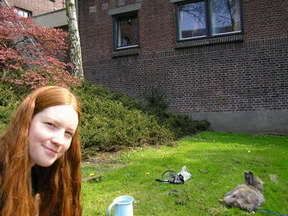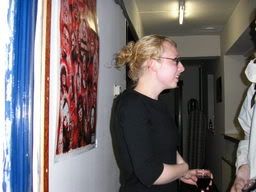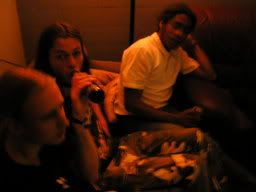Were There Blog Enough and Timeby
Ralph E. Luker
As the 20th century faded into the 21st, the Internet gave birth to a new form of communication, the weblog or "blog." A blog is a commonplace journal maintained on the Internet, where it is accessible to other readers. At the beginning of 1999, there were about two-dozen blogs known to exist. This was an intimate world, in which every blogger could be known to all other bloggers, but during that year the first free create-your-own-weblog tools became available and the numbers of bloggers grew into the hundreds.
1Blogs take a variety of forms, from daily personal journals to occasional essays. Some blogs are exclusively individual efforts; others are collective ventures or group blogs. Some are done anonymously or pseudonymously; other people blog in their own names. Some enable readers' comments in response to what they've read; others do not. Blogs by academics are a very small part of the blog world—or "blogosphere"—which by now according to various estimates includes over 5 million blogs, though the numbers change constantly and no one really knows for sure because the attrition rate is also high. By now, however, academic blogs include some high profile public intellectuals, such as Penn State's Michael Berube (
http://www.michaelberube.com) and Chicago's Richard Posner (
http://www.becker-posner-blog.com).
In mid-November 1999, 25-year-old Kevin C. Murphy was probably the first (future) historian to begin blogging. He was then an aide to James Carville, President Clinton's former senior political advisor, and is now a graduate student in 20th-century American political history at Columbia University. Despite his youth, the early launch of his Ghost in the Machine (
http://www.ghostinthemachine.net) earns Murphy the honor of being the elder statesman of history bloggers. In the history blogosphere, November 1999 is ancient history. Indeed, Swarthmore's Timothy Burke archives all of his blog, Easily Distracted (
http://www.swarthmore.edu/SocSci/tburke1), prior to December 2003 as "ancient blog." It isn't that blogging historians are overwhelmed by "presentism," but that the form itself is so new and in flux.
Two years ago, when I first became a blogging historian, history bloggers were vaguely aware of each other. A few of us, like historian/journalists Eric Alterman (
http://msnbc.msn.com/id/3449870) and Josh Marshall (
http://talkingpointsmemo.com), had a substantial audience. As our numbers grew and we slowly found each other, the virtual seminar of mutual teaching and learning built a sense of community. In September 2004, the group blog at the History News Network called Cliopatria (
http://hnn.us/blogs/2.html)—the blog to which I belong—created a list or "blogroll" of all known history blogs. So far, we have found about 145 of them, including one each in Dutch, Finnish, French, and Portuguese.
Since 2003 is "ancient history," anonymity is a possibility, and attrition so high among bloggers, history blogging already has its legendary figures. Foremost among them is Invisible Adjunct (
http://www.invisibleadjunct.com). This very smart, young historian, who noticed the ways in which she was marginalized as an adjunct professor of history, hosted engaging conversations about many subjects between February 2003 and August 2004. With astonishing rapidity, she found a large audience among academics, especially perhaps among women, but also men who were thinking about academic careers or who had already experienced the tough job market. It was a sad day in August for all of us who admired her work, when the Invisible Adjunct waved goodbye to history's marketplace, hung up her keyboard, and prepared to enter law school.
2 History departments missed an opportunity to make an appointment of rare quality, but we anticipate a second coming of IA at next year's AHA annual meeting, where she will appear on a panel discussion about history blogging.
Female history bloggers may be more likely to post anonymously or pseudonymously than males, but not all of them do. My colleagues at Cliopatria, Hala Fattah and Sharon Howard, are good examples. Born in Baghdad, Fattah did her graduate work and taught Near Eastern studies in the United States before returning to the Middle East, where she posts with us from Amman, Jordan. Before joining us, Fattah briefly posted her beautiful essays at Askari Street (
http://hnn.us/blogs/24.html), named for the street in Baghdad on which she grew up. Sharon Howard, a specialist in early modern British history, is currently on a postdoc at the University of Wales. Like many history bloggers, her work on the net began with a web site, in her case Early Modern Resources (
http://www.earlymodernweb.org.uk), to which her own blog, Early Modern Notes (
http://www.earlymodernweb.org.uk/emn), was subsequently associated. Both the web site and her blog are marked by an extraordinary resourcefulness and generosity of shared expertise.
Historians of very substantial accomplishment and a wide variety of interests are now blogging. The University of Michigan's Juan Cole does prize-winning Informed Comment (
http://www.juancole.com) on Middle Eastern affairs. The University of Alabama's David Beito leads a libertarian group blog called Liberty & Power (
http://hnn.us/blogs/4.html). Jon Wiener (
http://www.jonwiener.com) the blog of the historian at the University of California at Irvine, flogs his radio programming schedule; and Emory's Deborah Lipstadt promotes her recent book at History on Trial (
http://lipstadt.blogspot.com). Like Sharon Howard, Ohio State's prize-winning military historian Mark Grimsley blogs in conjunction with a sophisticated web site, War Historian.org (
http://warhistorian.org/home.php). His blog's title, Blog Them Out of the Stone Age, announces his intention to transform traditional military history. Grimsley claims our attention by juxtaposing photographs of Che Guevara and Robert E. Lee at the top of his site and holds it with fascinating posts that envision a postcolonial military history, explore the Civil War counter-factually, and frankly discuss the professional struggle upward. His blogging is also infectious, as one of his advanced undergraduate students has launched Classical Archaeologist (
http://classicalarchaeology.blogspot.com).
In a world where a 30-year-old graduate student is the elder statesman, a beginning law student who left the history job market is legendary, and an advanced undergraduate woman does classical archaeology, the population is fairly young. When I join them in the morning, I sometimes feel a little old and dull. But, there, the banquet feast is spread; and, then, the seminar begins. My young teachers are often graduate students or postdocs: Manan Ahmed, a native of Pakistan and graduate student at the University of Chicago, who blogs as Sepoy at Chapati Mystery (
http://www.chapatimystery.com), teaches me about south Asian history and culture; at Roblog (
http://www.robmacdougall.org), Rob MacDougall, a Canadian on a postdoc at the American Academy of Arts and Sciences in Cambridge, posts his remarkable essays on the history of American business and technology and shares his love of robots; and Caleb McDaniel, a young Texan at Johns Hopkins, blogs at Mode for Caleb (
http://modeforcaleb.blogspot.com), where he shares his love of jazz and remarkable understanding of trans-Atlantic abolitionism. I learn about current graduate student life at Harvard and religion and race in 17th-century Chesapeake Bay from Rebecca Goetz at (a)musings of a grad student (
http://rebecca-goetz.blogspot.com); and Esther MacCallum-Stewart, a postgraduate at England's University of Sussex, who blogs at Break of Day in the Trenches (
http://www.whatalovelywar.co.uk/war), teaches me about the cultural impact of World War I. MacCallum-Stewart, Paula Petrik (
http://www.archiva.net) of George Mason University, and Kelly Woestman of Pittsburgh State University, who blogs at Kelly in Kansas (
http://kellyinkansas.blogspot.com), are pioneering in the use of blogs as a tool for teaching history to their students.
3Why do they do it, you ask. My colleague at Cliopatria, Tim Burke (who also posts thoughtful essays at his own blog, Easily Distracted), recently offered five reasons:
Because I want to introduce some unexpected influences and ideas into my intellectual and academic work. I want to unsettle the overly domesticated, often hermetic thinking that comes with academic specialization. I want to introduce a "mutational vector" into my scholarly and intellectual work.
Because I want a place to publish small writings, odd writings, leftover writings, lazy speculations, half-formed hypotheses. I want a place to publish all the things that I think have some value but not enough to constitute legitimate scholarship. I want a chance to branch into new areas of specialization at a reduced level of intensity and seriousness.
Because I want to find out how much of my scholarly work is usefully translatable into a wider public conversation. A lot of my writings on Iraq, for example, are really a public working-out of more scholarly writing I'm doing in my current monograph, a translation of my academic engagement with the historiography of imperialism.
Because I want to model for myself and others how we should all behave within an idealized democratic public sphere. I want to figure out how to behave responsibly but also generatively, how to rise to the better angels of my communicative nature.
Because I'm a compulsive loudmouth.
4Burke's fifth point must have amused his colleagues at Swarthmore as much as it did his virtual colleagues in cyberspace, because he models for himself and others "how we should all behave within an idealized democratic public sphere" so very well.
But Burke's fifth point does raise one of the questions one hears about blogging: is it quite respectable? Perhaps it is not; but as a Methodist, I'm reminded of John Wesley's explanation of why he went out to the mines and fields of England to preach the gospel. "I resolved to be more vulgar," he said. Like Wesley, bloggers are occasionally dismissed as "enthusiasts." But think back to a time when you were young and discovered your passionate love of history. Think back to a time when your idealism told you that, if you could afford to do it, teaching and learning was what you would do, even if you were not paid to do it. I was not being paid when I found that Cliopatria had its first reader from Nepal, but money could not have bought the thrill of it. There I am, sitting on a blog in Atlanta, and my student on the other end of that blog is somewhere in the high reaches of Nepal. Amazing.
—Ralph Luker is the founder of and "blogmeister" at Cliopatria,
http://hnn.us/blogs/2.html.
Notes
* With apologies to Andrew Marvel and "To His Coy Mistress."
1.# Rebecca Blood, "Weblogs: A History and Perspective," Rebecca's Pocket (
http://www.rebeccablood.net/essays/weblog_history.html), September 7, 2000; January 7, 2005.
2. Scott Smallwood, "Disappearing Act: The Invisible Adjunct Shuts Down Her Popular Weblog and Says Goodbye to Academe," Chronicle of Higher Education, April 30, 2004, A10–11.
3. Austin Lingerfelt, "The Classroom Blog: A Moment for Literacy, A Moment for Giving Pause," Essence Renewed (
http://infestation.typepad.com/essence/2004/12/the_classroom_b.html), December 12, 2004; and Shola Adenekan, "Academics Give Lessons on Blogs," BBC News, January 23, 2005 (
http://news.bbc.co.uk/2/hi/uk_news/education/4194669.stm). With mixed results, Northwestern University's Eszter Hargittai, Steven D. Krause of Eastern Michigan University, and Georgia State University's Charles Tryon have had their students of communications, sociology, and literature respectively, maintain blogs as a part of their course work. See: Hargittai's Internet & Society Course Blog (
http://www.therockblog.com/); Krause, "When Blogging Goes Bad" Kairos, 9.1 (
http://english.ttu.edu/kairos/9.1/binder.html?praxis/krause/index.html); and Tryon's Writing to the Moment (
http://tryon1101.blogspot.com/) and Rhetoric and Democracy (
http://democracymatters.blogspot.com/).
4. Timothy Burke, "Burke's Home for Imaginary Friends," Easily Distracted (
http://www.swarthmore.edu/SocSci/tburke1/perma12605.html), January 26, 2005.
Copyright © American Historical Association.
http://www.historians.org/Perspectives/Issues/2005/0505/0505tec1.cfmon May 17, 2005



















 It was after the Gulf War that his mother and boyfriend at the time decided to 'descend' from the Holy land and set sail towards The Hague, being the birthplace of Even-Zohars
mother. Jonathan managed well in Grade school and High school, so the
next logical step was the University, the infinite source of knowledge.
After speculating on Industrial Design, Social Geography and Journalism
it was the study of History at Leiden that turned out to be his
decision.
It was after the Gulf War that his mother and boyfriend at the time decided to 'descend' from the Holy land and set sail towards The Hague, being the birthplace of Even-Zohars
mother. Jonathan managed well in Grade school and High school, so the
next logical step was the University, the infinite source of knowledge.
After speculating on Industrial Design, Social Geography and Journalism
it was the study of History at Leiden that turned out to be his
decision.
 Now, four years into the study, matters have only become more
complicated as this student advances towards World History; meaning the
complete array of fields a historian may implement in explaining the
entire past of the entire world to fellow men. It is especially the
philosophical character of World History that attracted Jonathan.
Now, four years into the study, matters have only become more
complicated as this student advances towards World History; meaning the
complete array of fields a historian may implement in explaining the
entire past of the entire world to fellow men. It is especially the
philosophical character of World History that attracted Jonathan.
 For him there is only one question that stands above all others like a
lonely chuchtower in some Flemish village, which asks the cause of the
Western Rise and the Industrial Revolution. Furthermore, the role of the
European self- and worldimage throughout its history may explain the
role of Europe in the Eurasian Human Web. Thus, the direct contact
between Islam and Christianity is to be investigated. Were Muslims
constantly on the verge of invading Europe? How did Arab people perceive
the 'barbaric' Christians? How was Science spread and how did the West
pick up knowledge form the Arabs or from further East? Europe and the
Islam are still not at peace, certainly not in the mind.
For him there is only one question that stands above all others like a
lonely chuchtower in some Flemish village, which asks the cause of the
Western Rise and the Industrial Revolution. Furthermore, the role of the
European self- and worldimage throughout its history may explain the
role of Europe in the Eurasian Human Web. Thus, the direct contact
between Islam and Christianity is to be investigated. Were Muslims
constantly on the verge of invading Europe? How did Arab people perceive
the 'barbaric' Christians? How was Science spread and how did the West
pick up knowledge form the Arabs or from further East? Europe and the
Islam are still not at peace, certainly not in the mind.